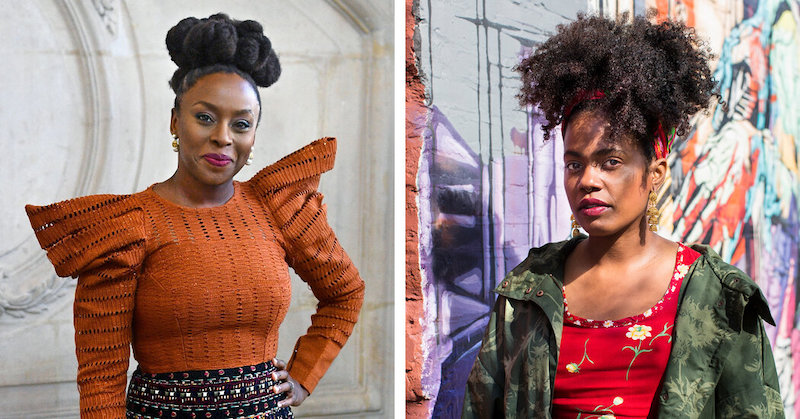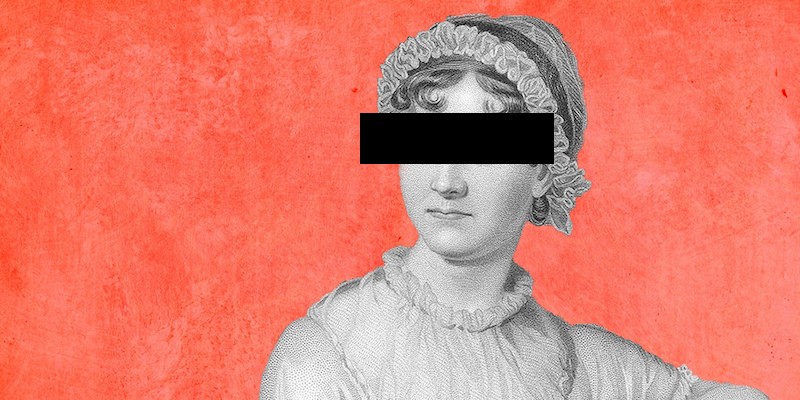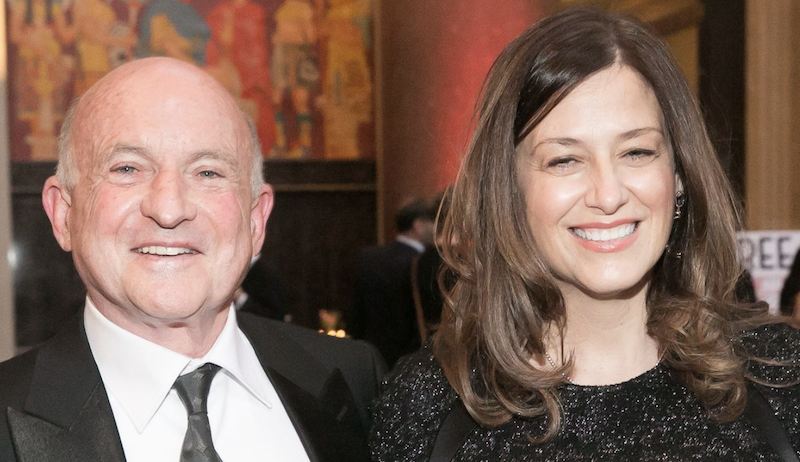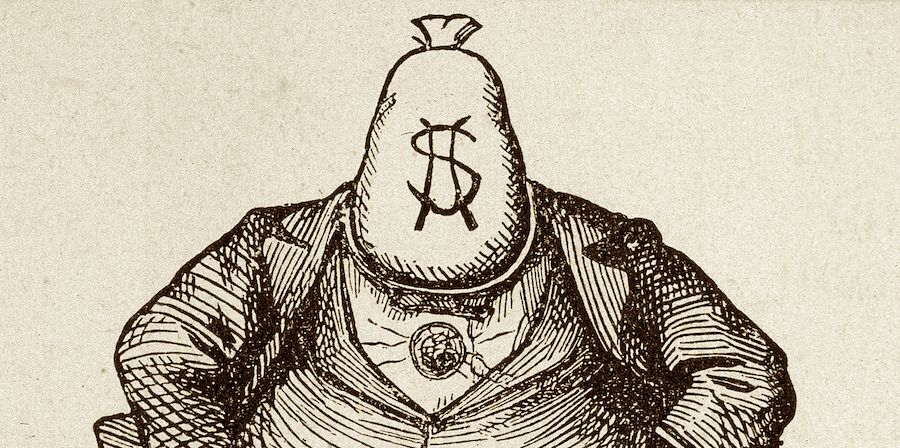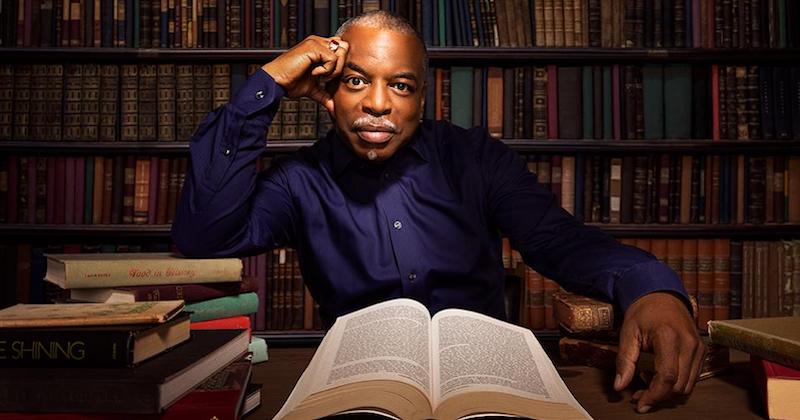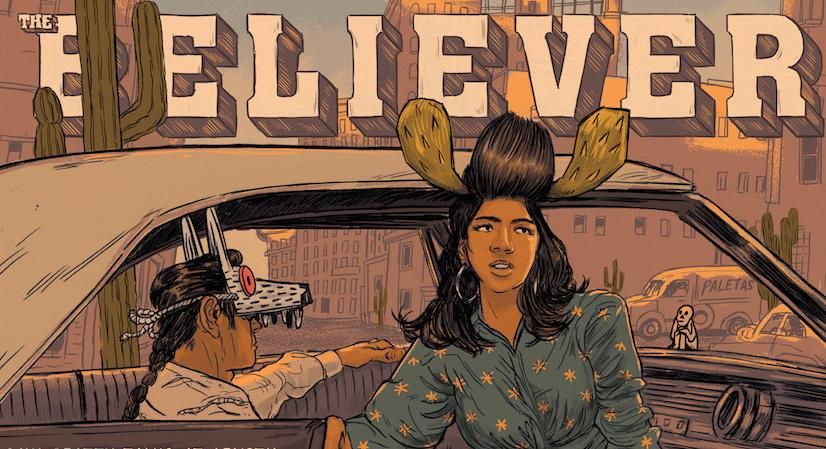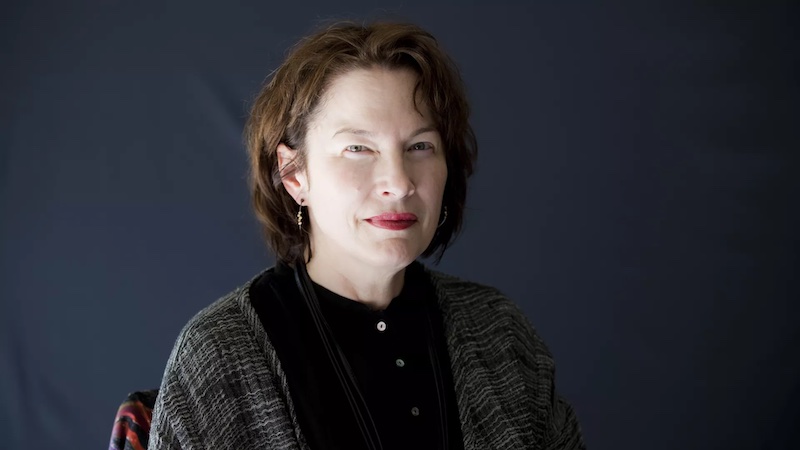What can we say about 2021, as a whole? It was a little bit better than 2020, if still not the greatest year in recent memory. It brought us many things: Bean Dad, Bernie’s mittens, Amanda Gorman, variants Delta and Omnicron, Taylor’s Version, but don’t forget Adele, Hot Vax Summer, the immediate end of Hot Vax Summer, Kate Winslet’s vape, the boat stuck in the Suez Canal, the return of Bennifer, the return of the ’90s, a free and glorious Britney, open movie theaters, the Friends reunion, an Asian American muppet on Sesame Street, Harry and Meghan on Oprah, Pete Davidson and Kim Kardashian, Simone Biles somehow being even more of a role model, that Star Wars meme, and, you know, THE VACCINE.
It also brought us a few developments in the wide world of literature. Today, we are proud to present the second installment in our countdown of the 50 biggest literary stories of the year, so you can remember the good, the bad, and the Joyce Carol Oates. (And yes, all of these really did happen this year. We checked.) Join us, won’t you:
30. Goodbye Sunshine: Reese Witherspoon sold her media company for… a lot of money.
Over the past few years, Reese Witherspoon has really become one of those Literary Celebrities. She’s got a beloved book club. She starred in the Little Fires Everywhere mini series, one of Hulu’s hottest (sorry) adaptations of last year. Her media company, Hello Sunshine, is responsible for bringing Gone Girl and Wild to the silver screen. And in August, the Academy Award winner announced she was selling it for a whopping $900 million to a company backed by the private equity firm Blackstone Group Inc. The new company is run by former Disney executives Kevin Mayer and Tom Staggs.
If you ask me, it’s kind of weird that the media company founded on the idea of having “women at the center of every story we create, celebrate and discover” is being sold to two white dudes, but Reese remains a ray of, well, sunshine. In her statement, she said, “Today, we’re taking a huge step forward by partnering with Blackstone, which will enable us to tell even more entertaining, impactful and illuminating stories about women’s lives globally.”
But if we could just go back to the $900 million for a moment. That’s 36,000,000 hardcover books. That’s 56,250,000 paperbacks. Ahead of writing this up, I googled “richest women in America,” thinking that Reese Witherspoon must be among them now. According to Forbes, she doesn’t even crack the top 10… is $900 million not a lot in the grand scheme of things? Who’s to say? Maybe Elle Woods should have overseen the contracts for this deal. –KY
29. Chimamanda Ngozi Adichie and Akwaeke Emezi’s long-standing feud erupted online.
To understand the origins of this feud, we have to go back to 2017. Adichie, who previously taught Emezi, was interviewed by Channel 4. During this interview, she was asked about feminism in relation to trans women. Adichie reportedly said, “Trans women are trans women. I think if you’ve lived in the world as a man, with the privileges the world accords to men, and then change gender, it’s difficult for me to accept that then we can equate your experience with the experience of a woman who has lived from the beginning in the world as a woman, and who has not been accorded those privileges that men are.”
Some people on social media pointed out the similarities between Adichie’s comments and J.K. Rowling’s views on trans women and gender identity, NPR noted, and in November 2020, Adichie defended Rowling in an interview with the Guardian. Emezi, who is a nonbinary person and whose pronouns are they/them, tweeted a long thread that accused Adichie of being transphobic.
In June of this year, Adichie published an essay on her website as a rebuttal to Emezi. In the essay, “It Is Obscene,” Adichie claims that Emezi is using her name for fame and attention without permission, insinuating that her former student is “a rank opportunist.” Soon thereafter, Emezi addressed Adichie’s essay in their Instagram stories and in a video. Although both sides have been quiet in their sparring lately, it’s safe to say that Emezi and Adichie aren’t going to reach a ceasefire any time soon. –VW
28. The Guardian published a Judith Butler interview—and then deleted a part that condemned gender-critical transphobia.
Back in September, The Guardian published a conversation between gender theorist Judith Butler and historian Jules Gleeson, only to delete several paragraphs a few hours later. These missing paragraphs included a discussion of the “gender critical” and “trans-exclusionary radical feminist” movement (or TERF), which insists on “biological sex,” and dismisses transgender rights. In the missing section of the interview, Butler discussed the ways in which anti-trans feminists and the right align over their negation of transness.
Some hours after the interview was published, Gleeson received an email with a note from The Guardian’s “Reader Complaints” section, which made it clear that complaints had gone “up the chain” of the paper’s editorial ladder, and editors had discussed the complaints without Gleeson present. The complaints honed in on Gleeson’s phrasing of a question, which cited the Wi Spa incident from this past summer. She had asked: “It seems that some within feminist movements are becoming sympathetic to these far-right campaigns. This year’s furore around Wi Spa in Los Angeles saw an online outrage by transphobes followed by bloody protests organized by the Proud Boys. Can we expect this alliance to continue?” The furore she references sparked from a viral video in which a customer complains about an individual’s exposed penis in the women’s section of the spa, and ultimately led to violent anti-transgender protests. At the time of writing the question, Gleeson was unaware of the fact that person charged with indecent exposure at Wi Spa was a registered sex offender. Even so, the video remained a catalyst for violent and transphobic protests. And though the interview was published, Gleeson’s questions went through many rounds of edits, no one brought up concerns over Wi Spa or Butler’s response.
Gleeson was contacted by an editor at The Guardian, who suggested adding details of the arrest as correction, but Gleeson was worried about potentially painting the Wi Spa incident in a way that would insinuate the dangerous myth of the “predatory trans woman.” In response, Gleeson was told that the team of editors believed removing the question entirely might be an answer (even though Butler’s response didn’t touch on the Wi Spa incident at all). And though Gleeson offered a rephrasing of the question, removing Wi Spa and instead referencing The Heritage Foundation’s hosting of a gender critical feminist panel as another incident of TERFs and the right aligning, The Guardian deleted the question and Butler’s response.
You can read the deleted section here. –SK
27. Abdulrazak Gurnah won this year’s Nobel Prize in Literature, and proceeded to sell some books.
This year’s Nobel Prize in Literature was awarded to Tanzanian writer Abdulrazak Gurnah “for his uncompromising and compassionate penetration of the effects of colonialism and the fate of the refugee in the gulf between cultures and continents.” The Nobel committee added, “His novels recoil from stereotypical descriptions and open our gaze to a culturally diversified East Africa unfamiliar to many in other parts of the world.”
Gurnah, who was born in Zanzibar in 1948 and fled to England as a refugee in the 1960s, is the sixth African ever to win the prize and the first Black African author to be awarded it since Wole Soyinka in 1986. At the time of the Nobel announcement, he did not have any books that were in print in the U.S.—previously, The New Press published his novel By the Sea in 2001, and Pantheon published Desertion in 2005. In short order, Riverhead acquired the rights to those two titles along with Afterlives, which Bloomsbury published in the UK in 2020.
Shortly after winning the prize, Gurnah commented that refugees and migrants are still met with resistance and racism in England. “It might seem as if things have moved on, but once again you get new arrivals, same old medicine … Same old ugliness in the newspapers, the mistreatment, the lack of compassion from the government,” he said, the Associated Press reported. –CS
26. Ah, the manufactured Jane Austen tea/racism controversy.
To cut to the chase: no, Jane Austen was not canceled for drinking tea this year. In April, news spread of a “woke madness” that sought to banish Austen from the internet and the general cultural landscape. But here’s what actually happened: The Telegraph published an article with a headline that exaggerated just a tad (“Jane Austen’s tea drinking will face ‘historical interrogation’ over slavery links.”), implying that Jane Austen’s House Museum in Chawton would be presenting an exhibit that would cast Austen’s tea-drinking habit as racist. To add to it, the article also referred to all the times Austen’s characters mentioned, drank, or talked about how much they liked tea, and the Black Lives Matter movement (uh, okay?).
Lizzie Dunford, the director of the Museum, said in the article that the Museum was “in the process of reviewing and updating all of [its] interpretation, including plans to explore the Empire and Regency Colonial context of both Austen’s family and her work.” This, it goes without saying (or at least it should), includes Austen’s abolitionist stance, as well as her father’s position as the trustee of an Antigua sugar plantation.
Needless to say, Twitter, the internet, and other media sites went into a frenzy. The Express compared the Museum’s plans to book-burning, while the Daily Mail called it a “revisionist attack.” The museum issued a statement in response to the mayhem, clarifying the intentions of the update. Here’s the takeaway: the plans, on the whole, have been taken out of context. Because Austen lived during slavery and Abolition of the Transatlantic Slave Tade in 1807, visitors often ask the museum about this and its connections with Austen and her novels. And because there’s already research about this connection, (it happens to be in the public domain), it only makes sense to include it as part of the museum. So rest-assured that the tea-drinking habits of Jane Austen, her characters, or anyone else for that matter, are simply not the concern for a (busy) cultural institution. –SK
25. Real-life succession drama plays out at Scholastic, world’s largest children’s book publisher.
It’s not often that a 1.2 billion-dollar, family-run, publicly traded company—headed by an 84-year-old—has no clear succession plan. (No, this isn’t a year-end wrap-up of our favorite TV shows.) But soon after the sudden death of Scholastic chairman and CEO Dick Robinson, who collapsed in June walking with his family on Martha’s Vineyard, a real-life succession drama began to play out in public.
It was announced in late July that Robinson—whose father Maurice founded Scholastic in 1920—had left, via a secret will, his controlling shares of the company to senior executive Iole Lucchese, much to the surprise of his sons John Benham Robinson, 34, and Maurice Robinson, 25. This, of course, got people talking. According to the Wall Street Journal, Robinson and Lucchese had been long-time romantic partners, whose relationship had ended a few years before his death. The New York Times talked to several Scholastic employees who corroborated the suggestion the two had been intimately involved over the years. Lucchese had worked her way up the corporate ladder at Scholastic, which is the largest children’s book publisher in the world, thanks in part to franchises like Harry Potter, The Hunger Games, and Clifford the Big Red Dog.
Ms. Lucchese, of course, is a 30-year venture of the company and a longtime senior executive, and there’s no reason to think she’s anything but qualified to helm the company; just as there’s no reason to think Robinson’s sons would be automatically ready to take over at their relatively young ages. As she said herself, of Robinson’s decision:
Dick understood that I shared his passion for Scholastic, and what this company means to the teachers we serve, to the children we serve, to everyone. He trusted me with that legacy, and I think it’s because we worked together and he knew that we were aligned.
Nonetheless, the whole story had a very ready-for-primetime arc to it, and there’s no doubt Succession writers were paying close attention to the details. –Jonny Diamond, Lit Hub Editor in Chief
24. UNC-Chapel Hill reversed its decision to not offer tenure to Nikole Hannah-Jones, but she decided to join the faculty at Howard University instead.
Nikole Hannah-Jones, the award-winning New York Times journalist behind The 1619 Project, seems to have become public enemy number one for the conservative crowd. In May, it was reported that UNC-Chapel Hill’s Hussman School of Journalism and Media decided not to offer Hannah-Jones tenure after her application was met with considerable pushback from the UNC-Chapel Hill Board of Trustees.
Then, in July, UNC had a sudden change of heart (read: they didn’t want the negative press) and walked back their initial decision. Hannah-Jones declined UNC’s revised offer and detailed her reasons in a statement released via the NAACP Legal Defense and Educational Fund. She explained, “I cannot imagine working at and advancing a school named for a man who lobbied against me . . . who ignored my 20 years of journalism experience, all of my credentials, all of my work, because he believed that a project that centered Black Americans equaled the denigration of white Americans.”
On CBS This Morning, Hannah-Jones confirmed to Gayle King that she would be joining the faculty at Howard University as the inaugural Knight Chair in Race and Reporting, along with Howard alumnus Ta-Nehisi Coates. In the wake of this controversy, many people on social media thought Hannah-Jones’s final choice was an example of “go where you are celebrated, not tolerated.”
On the surface level, this makes complete sense. However, the more I think about it, the more I realize the flaw in this aphorism: following this well-intentioned advice means accepting structural inequalities and discrimination without changing or challenging such injustice. We can be glad that Hannah-Jones is going to an environment where she will be appreciated and not vilified, but why did it have to come to this in the first place? –VW
23. Fiction writers expanded their presence on Substack.
This year, and more than ever, Substack was everywhere. The newsletter platform, which relies on subscription revenue rather than ads, has been around and popular for a few years now, but it’s mainly been the domain, so far, of political commentators or expats from traditional news media. Many journalists from the latter group, who have seen their newsrooms decimated over the last decade by a combination of falling ad revenue, resulting mismanagement (did someone say “pivot to video”?), and the erratic, sometimes-insane demands of covering the political events of the last four years with increasingly slim resources, have jumped at the chance to set their own work schedule and goals. (Some of them have, additionally, received hefty advances from the company.)
This year, while expanding those offerings, the platform has also drawn bigger names from publishing and literary media, including Salman Rushdie—who announced in September that he would launch a series of serialized fiction, essays, and other dispatches—along with Chuck Palahniuk, who will serialize a novel on Substack, and other fiction writers planning to do the same.
Of course, plenty of criticisms and concerns have accompanied this shift. Substack’s growing popularity has raised the question of how long it can act like a media company while eschewing all the ethical and editorial responsibilities of one; Substack CEO Chris Best has always framed Substack as a technology platform, rejecting the notion that its job is to moderate its contributors, which is a line that no longer seems to work in 2021. A number of critics have raised the concern that launching a slate of mini-publications with essentially no editorial oversight will only accelerate the already-very-advanced polarization and atomization of our media landscape.
Partly as a result, the platform has become what WIRED calls a “playground for the deplatformed,” namely writers and journalists that lost their jobs at traditional media companies—or quit—over various controversies that broadly fall into the long-debated and exhausting conversation about “cancel culture.” The backlash has already begun; writers that publicly reject Substack for that reason and others have started migrating to other alternatives, including Ghost, whose nonprofit status and policy of not paying writers have quieted some of the alarm bells that Substack raises. Nothing lasts forever. –CS
22. Scammers continued to scam.
Scammers and extortionists—they’re not limited to the music industry, self-certified wellness experts, or Manhattan socialites. In April, the New York Times reported on a scam that was impacting the organizers of literary prizes. The scammer, impersonating authors, would email the organizers and ask them to send the allocated prize money to a Paypal account. According to the Times, over the course of the past year, “At least five British book prizes have been targeted by the same swindle—and one has even paid out.” The identity of the scammer has yet to be identified.
Then, in August, Time reported that a curious saga was unfolding at Goodreads: authors were receiving threatening emails from anonymous servers that demanded they pay for good reviews or encounter the wrath of trolls. Self-published author Beth Black was one of the authors who received an email. She told Time, “I reported it to Goodreads and then a couple hours later, I started noticing the stars dropping on my books as I started getting all these 1-star reviews.” Authors also faced review-bombing, which is when a few users with multiple accounts or a group of people plan a coordinated attack on the review algorithm, sometimes well before the book has even been published. Many of the victims are marginalized authors who have been vocal about industry issues or social justice. And although many readers and authors don’t like Goodreads, the publishing industry views the website as a “necessary evil” to sell books. Time also noted that some of this chaos may be the platform’s own creation, as the lax security measures allow scammers and trolls to thrive.
Also in August, Vulture reported on the bizarre schemes of an unknown figure who, for years, impersonated publishing employees in order to get access to unpublished manuscripts. Unlike the Goodreads fiascos, this person wasn’t demanding monetary compensation or cyber-stalking the authors. One literary agent thought the fraudster was a reporter from Vulture. Others believed the culprit was a man who had worked in the industry for decades. So what did they ultimately hope to gain? The answer remains a mystery. –VW
21. The Great Gatsby entered the public domain.
On January 1, 2021, F. Scott Fitzgerald’s Great American Novel The Great Gatsby (along with everything else in the “greatest year for books ever”) entered the public domain, and pretty much everyone noticed. One day later, The Great Gatsby Undead was self-published on Amazon. Two days after that, we already had a traditionally-published prequel: Michael Farris Smith’s Nick. And the hits just keep on coming—it’s very likely that the Gatsby adaptation/remix/rewrite boom (or “glut,” you might say) has only gotten started. –ET
20. Romance Writers of America caused a racism-related controversy, tried to solve it, and in doing so . . . caused another racism-related controversy.
Romance Writers of America, the largest organization of writers in the country, has already been grappling with accusations of racism for years. Before 2019, their flagship award, the RITA, had awarded Black authors as finalists less than .05% of the time, and no Black romance author had ever won. It seemed that the RWA was making progress toward its equity goals when Kennedy Ryan and M. Malone became the first Black writers to win RITAs in 2019.
But in August 2019, trouble struck again when the RWA decided to punish one of their members for calling out racist writing. Popular author Courtney Milan, then the chair of RWA’s ethics committee, participated in a social media conversation about the racial biases of two book editors, both RWA members. The conversation noted one of the editors, Sue Grimshaw, had liked tweets questioning whether white supremacy was real, and had segregated Black authors’ romance books as the romance buyer at Borders; from there, Milan criticized another editor at the same publishing house, Kathryn Lynn Davis, for upholding racist stereotypes about Asian women in her book Somewhere Lies the Moon, including descriptions of Chinese people as having yellow faces and slanted eyes and Chinese women as being submissive and compliant. Another RWA member, author Suzan Tisdale, defended Grimshaw on Twitter, and Milan condemned Tisdale’s behavior in another Twitter thread.
Then, alas, the RWA took action. Tisdale and Davis filed complaints about Milan’s Twitter threads with the RWA, who then asked Milan to resign as chair of the Ethics Committee; the board then voted to suspend Milan’s membership for a year and ban her from holding any RWA leadership positions.
Things came to a head in December 2019 when Milan’s friend, the author Alyssa Cole, explained Milan’s censure in a viral Twitter thread. Learning this news, many authors spoke out in favor of Milan and aired stories of racism from local RWA chapters, including RWA chapters paying Black speakers half the usual speaker fee. (Chuck Tingle also weighed in.)
This backlash prompted an overhaul of RWA operations. The RWA president was removed; the 2020 RITAs were canceled; and finally, the RWA ended the RITAs and replaced them with a new award, the Vivians, named after RWA founder and Black romance publisher Vivian L. Stephens.
That’s progress, right? Not exactly. Flash forward to this July, when the inaugural Vivians were awarded—and the Vivian for Romance with Religious and Spiritual Elements was given to Karen Witemeyer’s At Love’s Command, which opens with a romanticized depiction of the Wounded Knee Massacre. No!! The male love interest is a 7th Cavalry officer because he “found his parents and baby sister murdered by a Comanche war party” (no!!) and he cites Scripture as he commands the Lakota Sioux to put down their weapons in the name of peace (double no!!) and then a “medicine man chanting” starts the massacre (no to the nth degree!!). The irony of lauding this book in Vivian L. Stephens’s name—especially after the RWA’s promises of increased diversity—incensed RWA members, many of whom canceled their memberships; contacted the RWA; removed their books as Vivian finalists and winners; and took to Twitter to express their displeasure, noting the difference between free speech and awarding offensive content, the Christian-favoring nature of the award category, and the RWA’s continually disappointing racial dynamics.
In response, the RWA rescinded At Love’s Command Vivian and released an equivocating statement, which itself was met with overwhelming criticism. It appears when an organization promises less racism, people get mad when it actually does more racism. Interesting! –WC
19. The New Yorker Union reached an agreement with management.
This summer, after almost two years of negotiations, The New Yorker union (and Pitchfork union and Ars Technica union) reached an agreement with their parent company. The unions, pushing largely for higher wages and health benefits, protested outside Anna Wintour’s home in Greenwich Village and threatened a strike leading up to the deal.
In addition to an increase of the annual salary floor (from $42,000 to $55,000, which will reach $60,000 by the third year of the contract), the new agreement guarantees a protection of work-life balance, a ban on non-disclosure agreements, and restrictions on increasing health-care costs.
“I am elated that we have such a strong contract for our members now and such a strong contract to build on in future negotiations,” said Natalie Meade, a fact checker and unit chair of The New Yorker union. According to Meade, the agreement allows the staff to “break the curse of stagnant wages” at the magazine and (shock, horror) actually have a liveable salary. –SK
18. LeVar Burton finally became a Jeopardy! guest host, only to get passed over because of network nepotism.
After the success of a massive fan campaign to get actor and national treasure LeVar Burton to take on the role previously filled by the late Alex Trebek, Burton was appointed Jeopardy! guest host from July 26th to July 30th. The decision seemed like a work of fate: after all, Burton had tweeted about wanting to host way back in 2013. But in August, the network announced that the new permanent host would be Mike Richards, the show’s executive producer. Burton advocates were rightly shocked. Jeopardy! fans wondered if this had been the plan all along and the revolving brigade of guests had been nothing more than a publicity stunt. However, Richards’s appointment was a short-lived disaster that crashed and burned.
Soon after the public confirmation of Richard’s official hiring, The Ringer unearthed Richards’s history of offensive, derogatory comments and past wrongful termination lawsuits, which caused the Anti-Defamation League to call for an investigation. Following The Ringer’s report, Richards resigned and then later was ousted as executive producer. In September, Sony Pictures Television announced that author and Big Bang Theory actor Mayim Bialik would host for the rest of the year, splitting duties with former champion Ken Jennings. The show’s producers are still searching for a permanent host. And as for Burton? Well, maybe losing out on the gig was a blessing in disguise—Burton no longer desires the hosting role. Burton said in an interview with The Daily Show’s Trevor Noah, “The crazy thing is that when you set your sights on something . . . what I found out is that it wasn’t the thing that I wanted after all.” Recently, Burton was named the grand marshall of the 2022 Rose Parade. So what’s the lesson in this whole mess? Sometimes when a door closes, a window opens. –VW
17. Two novels about The Internet came out at the same time, and The Internet noticed.
In February, two high-profile debut novels—by two debut novelists who were already famous on the literary internet—were published almost back to back. They were, of course, Lauren Oyler’s Fake Accounts (Catapult, February 2) and Patricia Lockwood’s No One Is Talking About This (Riverhead, February 16).
Despite the fact that the two novels were ultimately quite different in their projects, they were each in some way about the internet (specifically social media as we have experienced it in the last few years), and thus comparing them was irresistible, and so too was using their appearance to talk about the Internet and the Novel and the Internet Novel, though not everyone agreed on exactly what that even meant. Despite the fact that Sally Rooney has demurred from the discourse, it seems certain that the thinkpieces, unlike my heart, will go on. –ET
16. After 139 issues and one big scandal, The Believer announced the end of the road.
On April 30th, the Los Angeles Times reported that Joshua Wolf Shenk, publisher and editor in chief of beloved literary and arts magazine The Believer, and artistic and executive director of the Black Mountain Institute, had resigned from both positions.
The resignation followed an incident in February, which Shenk described in an email to staff as “a dumb, reckless choice to disregard appropriate setting and attire for a Zoom meeting.” Ira Silverberg told the LA Times that “Shenk was soaking in a bathtub with Epsom salts during the meeting to alleviate nerve pain caused by fibromyalgia. He had chosen a virtual background to mask his location and had worn a mesh shirt. When Shenk’s computer battery died, he got up to plug it in, believing the camera was off. But the video kept running.” Shenk exposed himself to about a dozen employees.
The incident was debated hotly on Twitter, with some readers of the LA Times Article comparing Shenk to Jeffrey Toobin, and others expressing sympathy for his chronic pain and the difficulty of our new pandemic normal of eroded professional boundaries. But only a few days later, a group of staff members from The Believer and the Black Mountain Institute released an open letter in response to the LA Times’ characterization of the event itself. “The version of events described by the article paints a picture of an unfortunate accident for which Shenk graciously apologized and offered his resignation,” the letter reads. “Some of us were on that call, Shenk was our boss, and this is not how we would tell that story.”
The letter continues:
We see this act as the culmination of a years-long pattern of inappropriate and disrespectful behavior that belies a chronic lack of care and concern for the comfort, boundaries, and safety of the staff—not to mention that of students, fellows, and others in BMI and The Believer’s communities. This pattern of behavior resulted in a workplace culture that was difficult and at times painful to operate within. We worked, in spite of this, to create the successful programs and publications BMI and The Believer are known for—work for which Shenk is credited throughout the LA Times article.
Unfortunately, in October, the Black Mountain Institute in the UNLV College of Liberal Arts announced in a press release that the February/March 2022 issue of The Believer would be its last. According to the release, “the decision is part of a strategic realignment within the college and BMI as it emerges from the financial impact of the COVID-19 pandemic.”
“This was not an easy decision but a necessary one, unfortunately,” Jennifer Keene, Dean of UNLV’s College of Liberal Arts, said in a statement. “The Believer consumed a significant portion of BMI’s resources. After reviewing the data with internal and external stakeholders, it was clear that there was no path forward to continue publishing the magazine. Print publications in general have been facing increasing headwinds in recent years, which makes them a financially challenging endeavor.”
“While The Believer is a highly regarded vehicle for both new and established literary voices, we have a responsibility to direct our resources to the initiatives most central to BMI’s mission,” Keene added. “As we focus on its core mission, support for BMI remains strong. We look forward to the continuation of the institute’s vibrant offerings and exceptional literary and community engagement.”
The announcement made no reference to the Shenk incident, but it is difficult not to connect the dots. –ET
15. After 40 years, the man convicted of Alice Sebold’s rape, detailed in her memoir Lucky, was exonerated.
The rape conviction at the center of The Lovely Bones author Alice Sebold’s memoir, Lucky, was overturned after an executive producer on its film adaptation started asking questions about the guilt of Anthony Broadwater, who served 16 years in prison after his conviction and spent 24 more on the sex offender registry. Following the exoneration, the film adaptation was canceled and Scribner pulled Lucky from shelves.
In Lucky, Sebold wrote about being raped as a first-year university student in 1981 and then recognizing a man in the street months later as her attacker. “He was smiling as he approached,” wrote Sebold in Lucky. “He recognized me. It was a stroll in the park to him; he had met an acquaintance on the street. ‘Hey, girl,’ he said. ‘Don’t I know you from somewhere?’ . . . I looked directly at him. Knew his face had been the face over me in the tunnel.”
After Broadwater—who is Black—was arrested, Sebold identified a different man in a police lineup. But Sebold identified Broadwater as her rapist on the witness stand, after a prosecutor purportedly told her Broadwater and the man she identified in the lineup were friends conspiring to trick her. Overturning Broadwater’s conviction, the defense argued that the case had relied solely on Sebold identifying Broadwater in the courtroom and microscopic hair analysis, which is now considered junk science. “I’m not going to sully this proceeding by saying, ‘I’m sorry.’ That doesn’t cut it,” Onondaga county district attorney William Fitzpatrick said at the court hearing where Broadwater was exonerated. “This never should have happened.”
Broadwater’s exoneration was set in motion by Tim Mucciante, producer of the film adaptation of Lucky, which was set to star Victoria Pedretti (“You”) as Sebold. Mucciante had signed on as executive producer of the adaptation, but when he saw the first draft of the script—which was significantly different from the book—and heard of plans to cast Sebold’s rapist as a white man, he became skeptical of Broadwater’s guilt. “I started poking around and trying to figure out what really happened here,” Mucciante told the Associated Press. Mucciante hired a private investigator, who put him in touch with the defense lawyers who eventually overturned Broadwater’s conviction. Wrote Mucciante in an op-ed for the LA Times, “Broadwater’s unfair conviction is yet another example of the racism our justice system perpetuates on people of color, especially Black people. The Lucky production, now canceled, was another way this kind of racism is monetized.”
“I’ve been crying tears of joy and relief the last couple of days,” Broadwater told the Associated Press. “I’m so elated, the cold can’t even keep me cold.” Broadwater finished his sentence in 1999, but remained on New York’s sex offender registry as he worked as a trash hauler and handyman; during this time, Broadwater refused to have children with his wife due to stigma.
After Broadwater’s exoneration, Sebold released an apology to Broadwater via Medium, apologizing for the fact that her “own misfortune resulted in . . . not only 16 years behind bars but in ways that further serve to wound and stigmatize, nearly a full life sentence.” Scribner, Sebold’s publisher, announced in a statement they are ceasing distribution of Lucky while they and Sebold “together consider how the work may be revised.” Pan Macmillan, Sebold’s UK publisher, confirmed to the Guardian they will also be pulling the title.
In a footnote to his LA Times op-ed, it was revealed that Mucciante’s production company, Red Badge Films, is producing a documentary about Broadwater’s conviction and subsequent exoneration, called Unlucky. –WC
14. Publishing’s commitment to spending millions on books by bad people maybe, possibly reached its limit? (LOL probably not.)
We all know that publishing is a business, and that sometimes, publishing houses put out books written by people who don’t agree with us. But there has to be a line somewhere, right? Last year, the line was—and then wasn’t, and then was, and then wasn’t—Woody Allen’s memoir. This year, it wasn’t Mike Pence, whose multi-million dollar book deal from Simon & Schuster was defended by the company even after a petition signed by over 200 employees and 3,500 outsiders, but it was—or it might be—Donald Trump. Even though Trump himself, of course, said differently.
In June, Trump claimed that he had received (and rejected) “very substantial offers” for his memoir from “two of the biggest and most prestigious publishing houses.”
“That doesn’t mean I won’t accept them sometime in the future, as I have started writing the book,” the statement went on. “If my book will be the biggest of them all, and with 39 books written or being written about me, does anybody really believe that they are above making a lot of money? Some of the biggest sleezebags [sic] on earth run these companies. No morals, no nothing, just the bottom line. And they sure wouldn’t admit it before the fact. But after the fact, they will stand by and say, ‘Let’s go.’”
However, when Politico asked all the biggest most prestigious publishing houses—ie the Big Five: Penguin Random House, Hachette Book Group, HarperCollins, Macmillan Publishers, and Simon & Schuster—nobody would cop to any knowledge of such an offer, and “most said they wouldn’t touch a Trump project when he does start shopping a book around.”
It seems obvious why not, but history hasn’t really borne that theory out (Pence is also bad). Still, times may be changing. “Publishing has always depended on blockbuster books to finance limited run titles by lesser-known writers, but where once blockbuster conservative books meant titles by ideologues like Ann Coulter, it now means multimillion-dollar memoirs by alums of a hateful and dangerous presidential administration, who feel no fealty to truth or facts,” wrote Adrienne Westenfeld in Esquire. “This business model has always been precarious at best, but now, it crosses into the realm of malicious profiteering, with the moral and financial stakes higher than ever. All of this leads us to a question: in 2021, what good is the political memoir genre doing us? Political memoirs can and should exist, but the genre’s current iteration operates like the Wild West, where even disgraced politicians facing criminal investigation can treat publishing as a bully pulpit for falsehoods, with a fat check as a reward. . . . Until fact-checking becomes an industry standard, this wave of half-baked, ‘collect your seven figure advance and pass go’ political books will continue to be a blight on public life. They are not important contributions to the historical record, as some claim, but rather, they are mercenary, profit-motivated volleys at any semblance of shared objective reality. In an era of vicious mendacity, it’s more important than ever that publishers take and hold a firm stance about unimpeachable (no pun intended) truth.”
“It doesn’t matter what the upside on a Trump book deal is, the headaches the project would bring would far outweigh the potential in the eyes of a major publisher,” Keith Urbahn, president and founding partner of Beltway agency Javelin, told Politico. “Any editor bold enough to acquire the Trump memoir is looking at a fact-checking nightmare, an exodus of other authors, and a staff uprising in the unlikely event they strike a deal with the former president.”
Of course, there are conservative imprints out there who are surely more than willing to take him on. Or he can always self-publish. But perhaps Big Publishing will stick to its guns for once. (Please?) –ET
13. Free speech defenders launch university website in free speech mecca of Texas.
From the newsmaking noise of the Harper’s letter to the launch of Yascha Mounk’s Persuasion to the legacy media migration that spawned so many grievance-fueled Substack sinecures, the “anti-woke” wing of contemporary liberalism has always enjoyed more than its fair share of free speech.
So it’s no surprise that the most prominent among the “cancel cancel culture!” gang decided to start a university of their very own, which, per its website (which currently also doubles as dorm, chapel, football stadium, quad, dining hall, and Sackler-funded rec center) is “devoted to the unfettered pursuit of truth … [which is] the cornerstone of a free and flourishing democratic society,” and is “fully committed to freedom of inquiry, freedom of conscience, and civil discourse.” Ok, so far so good.
So, what better place to aspire to such lofty ideals than in a state that prides itself on defending the core values of free and open inquiry, in which no idea is too complex, too darkly provocative to be held up to the bright light of truth, where students are given the chance to think for themselves, where no book is too dangerous, where… just kidding, it’s going to be in Texas.
One can only assume that UATX founders Panos Kanelos and Joe Lonsdale (Palantir!), along with advisors and trustees like Bari Weiss, Niall Ferguson, Robert Zimmer, and Steven Pinker will be aiming their collective intellectual heft and significant media reach directly at the 30-plus American states currently attempting to legislate against the free and open pursuit of historical inquiry in their classrooms… (Wait what? You’re telling me Steven Pinker already dropped out? Zimmer too?! And that the University of Austin appears to be more concerned with woke Twitter pile-ons than with Republican state houses banning books? Banning actual words, like “inequality” and “gay”?)
Well I’ll be damned. –JD
12. The “Cat Person” discourse returned, with a vengeance.
It’s hard to remember now, but before Kidney Person became the year’s (century’s?) defining life-appropriation controversy, another example of “bitch stole my life” caused a minor kerfuffle on the literary internet. I’m speaking, of course, about Cat Person Person.
Three and a half years after The New Yorker published Kristen Roupenian’s discourse-igniting short story, Slate published a personal essay by Alexis Nowicki about the strangeness of recognizing some very specific details of her own life and relationship in the story. As it turned out, Roupenian did know Nowicki’s one-time boyfriend, and did incorporate details of her perception of their relationship into the story. “Using those facts as a jumping-off point,” Roupenian wrote in an email to Nowicki, “I wrote a story that was primarily a work of the imagination, but which also drew on my own personal experiences, both past and present.”
Nowicki’s essay is primarily about her own feelings about becoming a character in someone else’s story—she doesn’t condemn Roupenian, or make any sweeping statements about the ethics of fiction writing. But, the internet being the internet (and “Cat Person” being “Cat Person”), Book Twitter couldn’t help but spend several days defending the rights of writers to hoard personal details about anyone they’ve ever met (or, in the case of Nowicki, heard about on social media) and deploy them, lightly fictionalized, for public consumption. (No shade—I absolutely do this, too.)
The real lesson here, of course, is that the Cat Person cottage industry is as strong as ever. (See also: the announcement, several weeks after the essay’s publication, that Nicholas Braun, aka Cousin Greg from Succession, had been cast as Robert in the film adaptation of the story.) –JG
11. Authors and publishers learned the power of #BookTok.
This year, authors and publishers discovered a new advertising opportunity: #BookTok, a literature-loving corner of TikTok where readers post videos inspired by books they love. Some of the videos are straightforward recommendations, some about book trends, and some are humorous memes—they’re fun for TikTok users, while basically advertising the books they cite. (Also there’s discourse. But that’s another conversation.)
The TikTok algorithm already popularized dark academia, PinkPantheress, the Renegade, and blush applied to the nose, and it’s done the same for backlist books, skyrocketing their sales. For instance, Adam Silvera’s 2017 novel They Both Die at the End leapt to the top of the teen fiction charts, selling more than 4,000 copies a week (!), after users started filming themselves sobbing as they read the last line of the book. Now, according to The Guardian, the book has sold over 200,000 copies in the UK, with well over half sold in 2021. Authors who have their own big followings on BookTok are also poised to claim big sales numbers, such as Chloe Gong, who had over a hundred thousand followers on TikTok through making regular BookTok videos before releasing her debut YA novel, These Violent Delights, which made the New York Times bestseller list.
Publishers and writers have grown wise to the marketing value of TikTok, and have acted accordingly: presses have started collaborating with BookTok influencers, and, for instance, nearly all Barnes and Noble locations have made designated BookTok tables or shelves as well as created a BookTok section on their online site. BookTok’s made it clear that young people care about reading, and in this way, at least, publishers are listening. –WC



